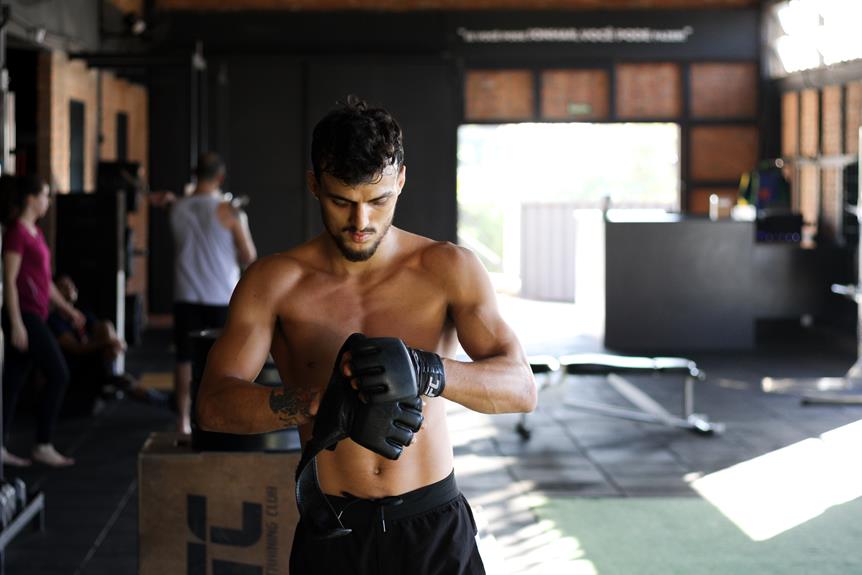Step into the somber world of the Ultimate Fighting Championship (UFC), where the pursuit of greatness in the octagon sometimes exacts a tragic toll.
In this article, delve into the updated account of the deceased UFC fighters, each with their own untold story of triumph and sorrow.
From heart attacks to brain hemorrhages, these warriors faced a range of fatal circumstances.
Discover the high price of greatness as we explore the lives and deaths of these fallen fighters.
Key Takeaways
- The majority of deaths among UFC fighters occurred after they had left the UFC.
- Many of the fighters who died were relatively young, with the average age at the time of death being around 33.
- The most common causes of death among UFC fighters were heart attacks and cancer.
- None of the deaths were a direct result of a fight in the UFC.
Deaths in the UFC: Gilbert Aldana
Gilbert Aldana, a former UFC heavyweight fighter, tragically died on March 11, 2007, at the age of 29 due to drowning. His death highlights the importance of mental health and the role of safety protocols in preventing deaths in the UFC.
Mental health is a critical aspect of a fighter’s well-being, as the intense physical demands and pressures of the sport can take a toll on their mental state. It’s crucial for the UFC to prioritize the mental well-being of its fighters by providing adequate support and resources for mental health issues that may arise.
Additionally, safety protocols play a vital role in preventing deaths in the UFC. Strict regulations, medical screenings, and thorough safety measures must be implemented and followed to ensure the fighters’ safety during training and competition.
Deaths in the UFC: Evan Tanner
Two years after Gilbert Aldana’s tragic death, another UFC fighter, Evan Tanner, lost his life due to heat exposure on September 5, 2008, at the age of 37. Tanner, a former UFC middleweight champion known for his ground-and-pound skills, left behind a lasting legacy in MMA. His death raised important questions about fighter safety and the impact of heat exposure in the sport.
Examining the impact of heat exposure on fighter safety:
- Heat exposure can be a serious threat to fighters, especially during intense training sessions or in hot climates.
- Dehydration and heatstroke are potential risks that can lead to severe health complications.
- Proper hydration and temperature regulation measures should be implemented to safeguard fighters’ well-being.
- Tanner’s tragic death serves as a reminder of the importance of prioritizing fighter safety and implementing effective protocols to prevent heat-related incidents in the UFC.
Deaths in the UFC: Justin Levens
Justin Levens, a former UFC fighter, tragically died by suicide on December 17, 2008, at the age of 28. His death shed light on the importance of mental health in MMA and sparked conversations about the prevention of fighter deaths in the UFC.
The high-pressure environment of professional fighting, coupled with the physical and emotional demands placed on fighters, can have a significant impact on their mental well-being. It’s crucial for the UFC and other organizations to prioritize mental health support and resources for their athletes.
This includes providing access to counseling, therapy, and education on mental health awareness. By addressing the mental health needs of fighters, the UFC can help prevent future tragedies and create a safer environment for all its athletes.
Deaths in the UFC: Justin Eilers
Despite his promising career in the UFC, Justin Eilers tragically lost his life on December 25, 2008, at the age of 30 due to being shot and killed by his stepfather.
Eilers had 4 fights in the UFC and was known for his knockout power. His career in the UFC was cut short, leaving fans and the MMA community mourning the loss of a talented athlete.
The impact of mental health in the UFC can’t be overlooked, as it’s an issue that affects athletes in all sports. While the specific details surrounding Eilers’ mental health aren’t known, it’s important to recognize the importance of mental well-being and provide support for fighters who may be struggling.
The tragic death of Justin Eilers serves as a reminder of the need for mental health awareness and resources within the UFC community.
Deaths in the UFC: Shane Del Rosario
Shane Del Rosario’s death in the UFC was a tragic loss, occurring on December 9, 2013, at the age of 30 due to anoxic encephalopathy, which is a lack of oxygen to the brain. Anoxic encephalopathy occurs when the brain is deprived of oxygen for an extended period, leading to severe damage and ultimately, death. This condition can have a devastating impact on cognitive function, motor skills, and overall brain health. The effects of anoxic encephalopathy can be long-lasting and irreversible.
In examining the role of chronic traumatic encephalopathy (CTE) in Tim Hague’s fatal brain hemorrhage, it’s important to note that CTE is a degenerative brain disease that has been linked to repeated head trauma, such as that experienced in combat sports like MMA. CTE is characterized by the buildup of abnormal proteins in the brain, which can lead to cognitive decline, mood disorders, and, in severe cases, fatal brain hemorrhages.
While an autopsy revealed that Tim Hague likely had CTE, it’s crucial to continue researching and implementing measures to protect the health and safety of athletes in combat sports.
Notable UFC Fighter Deaths: Emmanuel Yarbrough
Unfortunately, Emmanuel Yarbrough, a notable UFC fighter, tragically passed away on December 21, 2015, at the age of 51 due to a heart attack. Yarbrough competed at UFC 3 and represented sumo wrestling. He holds the distinction of being the heaviest UFC fighter of all time, weighing in at a staggering 616 lbs (279.4 kg).
His death raised questions about the impact of weight on the health of UFC fighters. As a result, a death investigation was conducted to determine if Yarbrough’s weight played a role in his heart attack. This investigation shed light on the potential dangers of extreme weight cutting and the need for stricter weight management protocols in the UFC.
The findings from Yarbrough’s case have contributed to ongoing discussions and efforts to prioritize fighter safety and well-being in the organization.
Notable UFC Fighter Deaths: Kevin Randleman
After his death on February 11, 2016, at the age of 44 due to a heart attack following pneumonia, Kevin Randleman became another notable UFC fighter to be included in the list of deceased fighters. Randleman, the UFC heavyweight champion in 1999, left a lasting impact on the sport of mixed martial arts.
His cause of death, a heart attack, is unfortunately not uncommon among notable UFC fighters. The passing of fighters like Randleman has had a profound impact on the UFC community, reminding everyone of the physical demands and risks associated with the sport.
These deaths serve as a reminder of the sacrifices made by fighters and the importance of taking care of one’s health both during and after their careers. The UFC community mourns the loss of Kevin Randleman and continues to honor his legacy in the sport.
Notable UFC Fighter Deaths: Kevin Ferguson (Kimbo Slice)
Kevin Ferguson, also known as Kimbo Slice, was a notable UFC fighter who tragically passed away on June 6, 2016, at the age of 42 due to traumatic heart failure. Kimbo Slice had a significant impact on the world of MMA and left behind a lasting legacy.
Here are four key aspects of Kimbo Slice’s impact and legacy:
- Internet Sensation: Kimbo Slice gained fame through his street fighting videos that went viral on the internet. His raw and powerful fighting style captivated audiences and helped him build a massive online following.
- Transition to the UFC: Kimbo Slice’s popularity eventually led to him joining the UFC. Although his UFC career was short-lived, he made a notable impact by winning his debut fight against Houston Alexander.
- Mainstream Recognition: Kimbo Slice’s larger-than-life persona and captivating fighting style attracted mainstream attention to the sport of MMA. His presence in the UFC helped bring MMA to a wider audience and solidified its place in popular culture.
- Cultural Icon: Kimbo Slice’s impact extended beyond the octagon. He became a symbol of resilience, determination, and the pursuit of greatness. Kimbo Slice’s legacy serves as an inspiration to aspiring fighters and fans alike, reminding them of the power of hard work and dedication.
Notable UFC Fighter Deaths: Ryan Jimmo
Ryan Jimmo, a notable UFC fighter, tragically lost his life on June 26, 2016, as a result of a hit-and-run incident.
The risk factors for hit and run incidents in combat sports are multi-faceted.
Firstly, the nature of combat sports involves intense physical contact and aggression, which can lead to heightened emotions and potential altercations outside of the ring or cage.
Additionally, the fame and recognition that fighters achieve can make them targets for jealous or disgruntled individuals.
To prevent brain hemorrhages in combat sports, several measures can be taken.
Regular medical screenings and check-ups can identify any pre-existing conditions that may increase the risk of brain hemorrhages.
Additionally, implementing stricter rules and regulations regarding head trauma and ensuring proper training techniques can help minimize the occurrence of such injuries.
It’s crucial to prioritize fighter safety and well-being in combat sports to prevent tragic incidents like Ryan Jimmo’s untimely death.
Conclusion
In conclusion, the list of deceased UFC fighters serves as a sobering reminder of the risks and sacrifices involved in pursuing a career in mixed martial arts. While the causes of their deaths vary, it’s clear that the physical demands of the sport can take a toll on the fighters’ health.
Despite the tragedy, the UFC continues to produce incredible athletes who push the boundaries of human capability. It’s important to remember and honor those who’ve lost their lives in their pursuit of greatness in the octagon.
- 15 Best Martial Arts Weapons (Fighting & Training) - October 14, 2024
- Is Fencing a Martial Art? (Yes, 4 Reasons Why) - October 14, 2024
- 7 Best Martial Arts for Self-defense Ranked (Highly Effective) - October 14, 2024










